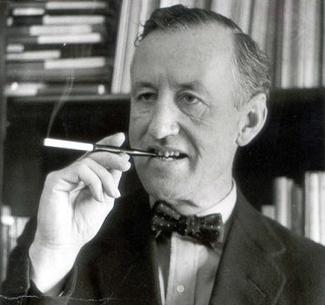
Image via Wikipedia
One of the more recent WIPO decisions caught my eye as it was for the domain ianfleming.com
Ian Fleming was, of course, the creator of James Bond and wrote all 14 novels, as well as Chitty Chitty Bang Bang.
This year happens to mark the centenary of his birth, which may or may not be a coincidence:
The intellectual property rights associated with the name Ian Fleming passed upon his death to the trustees of the Ian Fleming Will Trust, for the benefit of Ian Fleming’s family. The trustees of the Will Trust (the first and second Complainants) have all the rights and responsibilities of executors of Ian Fleming’s estate. The trustees wholly own and control the third Complainant, which was incorporated to hold the registered intellectual property rights and to exploit the various rights associated with Ian Fleming’s estate, including the name “Ian Fleming”.
Authors may have trade mark rights in the names by which they become well known, and can demonstrate this either through registered trade mark rights, or through deployment of the name as source indicators in commerce (establishing common law rights).
The Complainants have registered and common law trade mark rights in IAN FLEMING.
The third Complainant is the registered proprietor of two registered trade marks over the word mark IAN FLEMING: one which has effect in the United Kingdom of Great Britain and Northern Ireland (filing number 2271122, filed on May 24, 2001), while the other has effect in the European Community (filing number 2475234, filed on November 23, 2001). Both of these marks are registered over a wide range of goods and services.
During his lifetime, Ian Fleming himself acquired goodwill in the IAN FLEMING mark through use of his personal name as author. These unregistered rights were transferred to the Complainants after his death, and the Complainants have continued to use the IAN FLEMING mark and also acquired goodwill in that mark.
Aside from creating the James Bond character and authoring many books about that character, Ian Fleming was also a travel writer, and published many other novels, including Chitty Chitty Bang Bang (which was adapted to film in 1968 and stage musicals in 2002 to 2005). There have also been two biographies published on Ian Fleming, and several television biographies released.
The name Ian Fleming is well known in its own right, but it has also been extensively advertised and promoted through television and print media advertising, and has received substantial media coverage. An exhibition will be held throughout 2008 and 2009 months at the Imperial War Museum in London, to celebrate Ian Fleming’s life. In association with the exhibition, the Royal Mail is releasing six commemorative “Ian Fleming’s James Bond” stamps and “Ian Fleming” merchandise will be produced and sold.
Due to the above factors, the distinctive IAN FLEMING mark has become famous and well known worldwide and holds significant valuable goodwill for the Ian Fleming Will Trust. The name has acquired a secondary meaning, as the public associates “Ian Fleming” with the writings of and characters created by the author.
The Complainants use the registered Ian Fleming trade marks, and also license such rights to third parties.
The disputed domain name consists of the IAN FLEMING mark in its entirety.
In either case the WIPO decision was not only clearcut, but also made reference to several other previous decisions involving the registrant.
While a pattern of behaviour in itself is not reason to transfer it obviously indicates abusive use:
here have been a number of findings of bad faith against the Respondent in relation to domain name disputes involving famous people (see for example Larry King v. Alberta Hot Rods, WIPO Case No. D2005-0570 <larryking.com>; Pamela Anderson v. Alberta Hot Rods, WIPO Case No. D2002-1104 <pamelaanderson.com>, <pamelaanderson.net> and <pamelalee.com>, Tom Cruise v. Network Operations Center / Alberta Hot Rods, WIPO Case No. D2006-0560 <tomcruise.com>).
The Panel finds that the Respondent registered the disputed domain name in bad faith.
The disputed domain name currently resolves to the Respondent’s Celebrity 1000 website. The Respondent earns revenue from diverting users to its sponsored links on that website. The Respondent’s use of the disputed domain name has demonstrably been to attract, for financial gain, Internet users to the Respondent’s website, by creating the likelihood of confusion with the Complainants’ mark as to the source, sponsorship, affiliation or endorsement of the Respondent’s website.
The Panel finds that the Respondent is using the disputed domain name in bad faith.
The disputed domain name has been registered since 1996. Ordinarily, the length of time which has elapsed between the registration of the disputed domain name and the bringing of the Complaint may have been a cause of concern as, in some cases, delay has been considered to be a waiver of rights. However, the Panel adopts the reasoning of the panels in Dire Straits (Overseas) Limited v. Alberta Hot Rods, WIPO Case No. D2007-0778 and Tom Cruise v. Network Operations Center/Alberta Hot Rods, WIPO Case No. D2006-0560. The Respondent has not suffered from the delay and the delay does not impact on the Complainants’ right to obtain relief.
The evidence, in the Panel’s view, supports the conclusion that the Respondent sought to profit from, or exploit the trade marks of the Complainants. Accordingly, the Panel concludes that the Complainants have satisfied its burden of showing bad faith registration and use of the disputed domain name under paragraph 4(a)(iii) of the Policy.